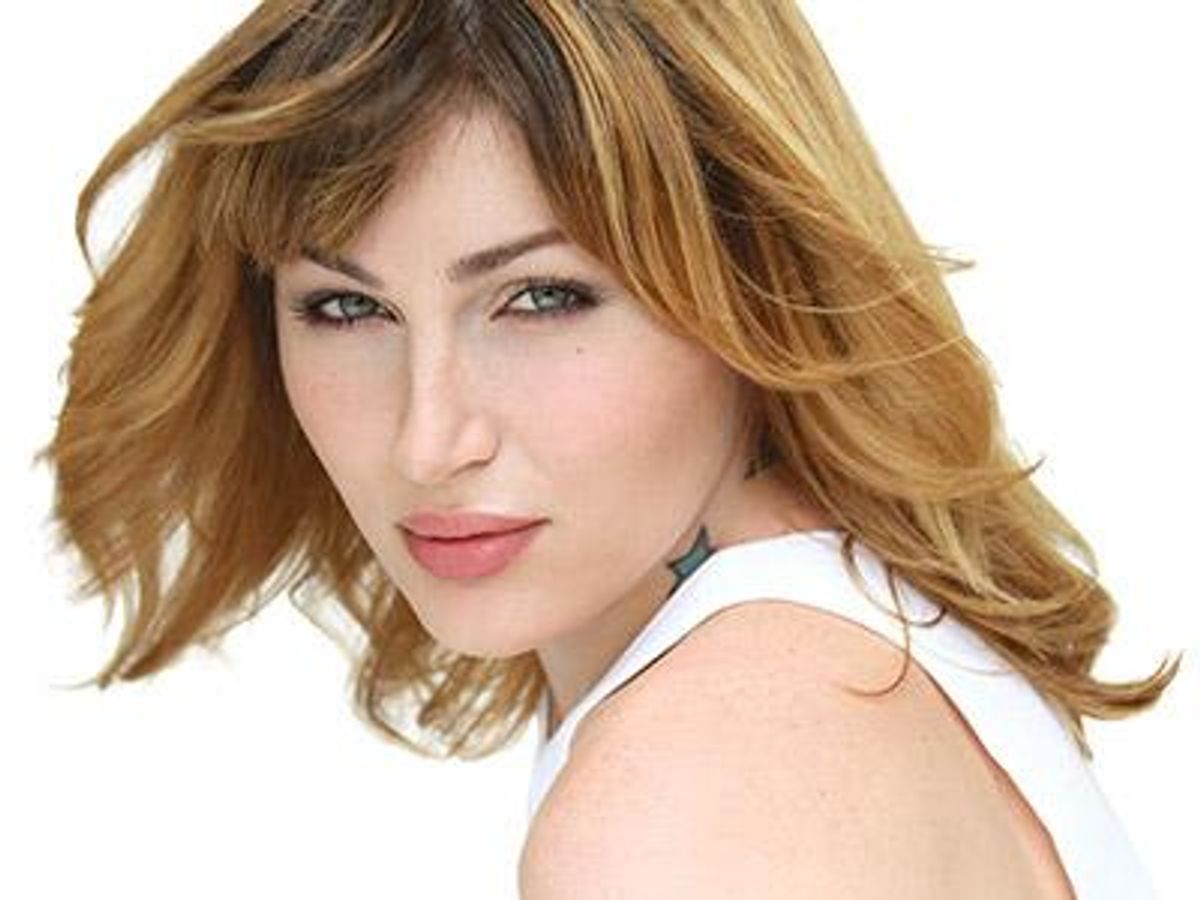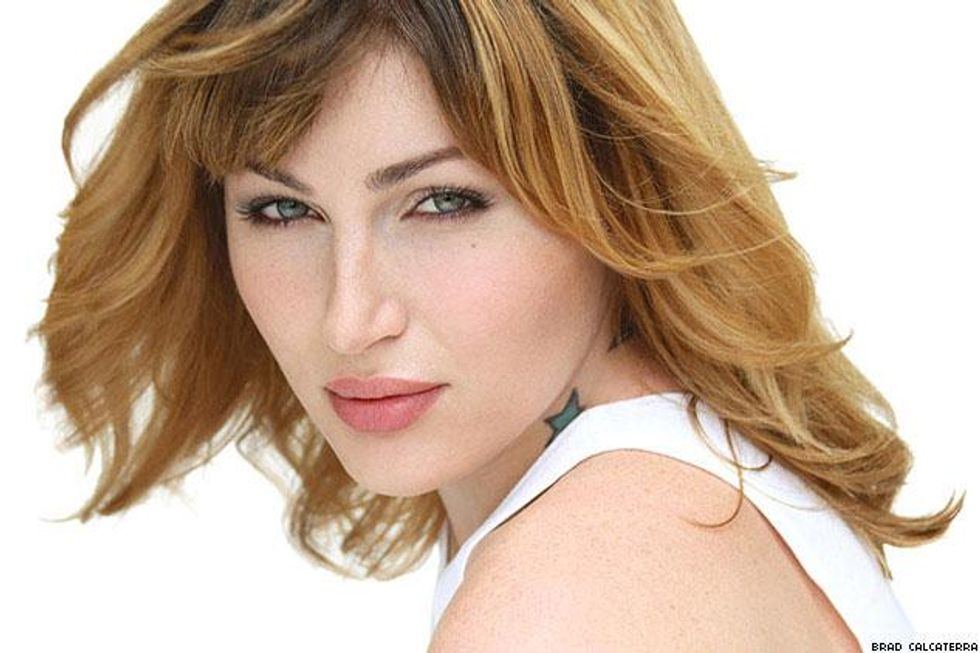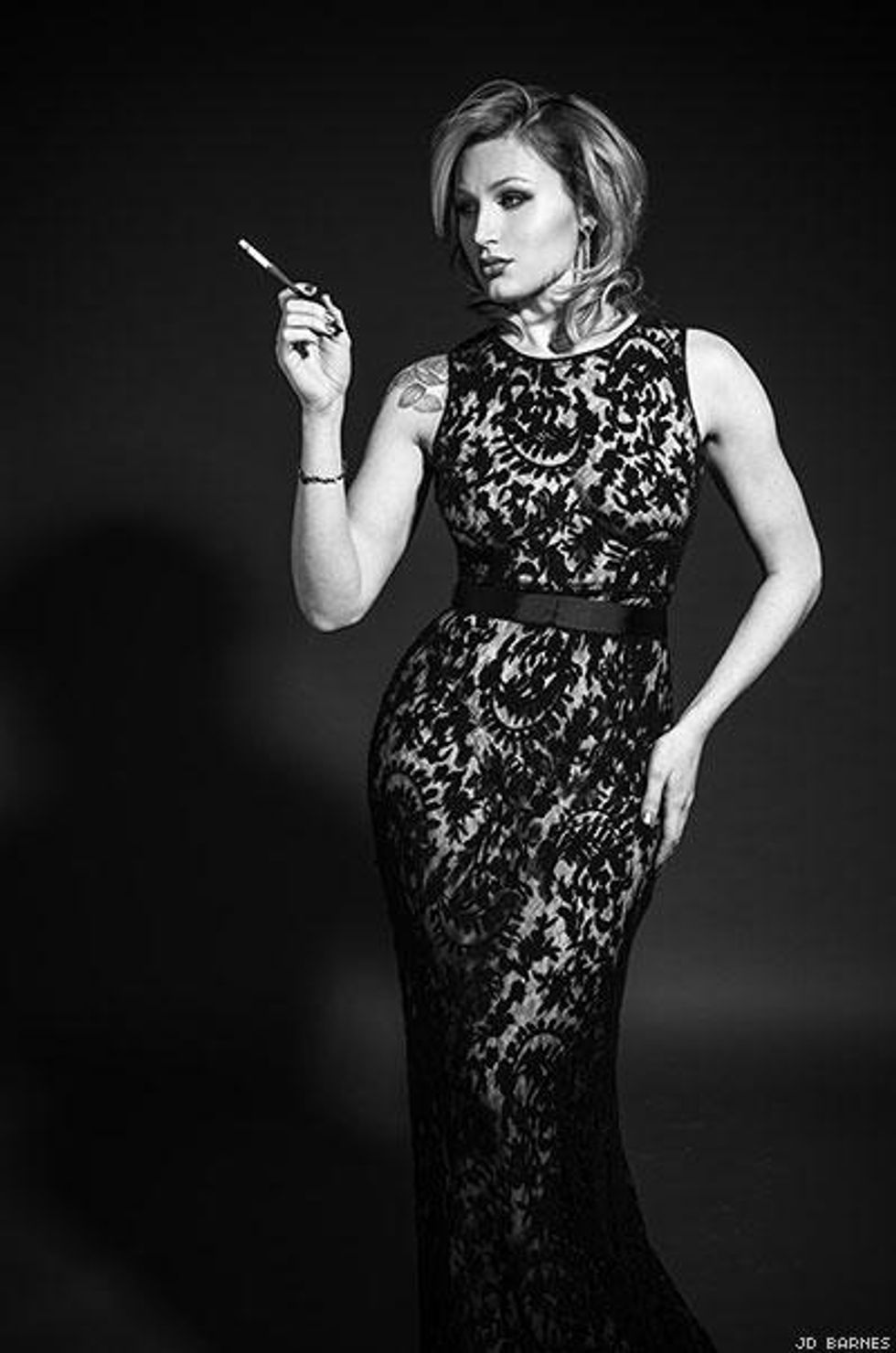 Corresponding with The Advocate as she travels home from Puerto Rico, Trace Lysette is full of gratitude tinged with a hint of awe. It's not necessarily easy to sound humble while telling someone you're flying home from a days-long TV pilot shoot, but Lysette remains genuine in spite of the glamour.
Corresponding with The Advocate as she travels home from Puerto Rico, Trace Lysette is full of gratitude tinged with a hint of awe. It's not necessarily easy to sound humble while telling someone you're flying home from a days-long TV pilot shoot, but Lysette remains genuine in spite of the glamour.
In fact, it's not hard to tell that she's probably smiling widely on the other end of the screen. And Lysette has plenty to smile about.
The New York-based actress, known for her turn as sassy yoga instructor Shea on Transparent, has been living out her acting dreams since she landed her role in the trans-themed Amazon breakout hit last year.
And now, she reveals to The Advocate, Lysette has been cast in recurring roles in two upcoming TV comedies: "brash head waitress" Gloria Del Rey on NBC's new drama The Curse of the Fuentes Women and Gisele in quirky Starz comedy Blunt Talk, which has found her shooting alongside childhood idol Patrick Stewart.
"I used to watch Star Trek on weeknights as a kid while I did my homework for school," Lysette marvels. "To wake up and go to work with someone you grew up watching is truly a dream."
Lysette has nothing but glowing words for her coworkers, including Stewart and "incomparable" out trans actress Alexandra Billings -- who was cast as Transparent's tough but kind trans mentor Davina, in the role Lysette originally auditioned for -- and for show creator Jill Soloway, who Lysette calls "an example of awesome humankind," adding, "I love her." Though Lysette didn't land Davina, she remains focused on the best part of the experience: being surrounded by other trans actresses. "Though we were each other's competition, it was a beautiful thing to be around other strong, talented trans women," she says.
The moment is particularly meaningful for Lysette, who at one point could never imagine herself in such company. The world Lysette now finds herself in seemed unfathomable not because she couldn't envision her peers' existence -- "Aleshia Brevard had broken that barrier [for trans actresses in Hollywood] years before," she notes -- or even because she couldn't imagine a role like hers existing in a world where humanized trans stories were only beginning to gain traction.
For Lysette, being surrounded by fellow out and proud trans women might have seemed impossible even a few years before because she herself was not openly trans. Her interview with The Advocate is the first time she's publicly talked about her years of living in the closet while working in Hollywood.
"I started my acting career in 2008 going out for cisgender [nontrans] roles," she recounts. Throughout the following five years of taking acting classes, landing an agent, and attending auditions, Lysette says she remained in the closet. Her first break came in a guest spot as sex worker Lila on the 14th season of long-running crime procedural Law & Order: Special Victims Unit. It's an experience Lysette calls "a rite of passage in this business," and one shared by her friend and fellow out trans actress Laverne Cox.
"I never disclosed I was trans to anyone in the casting process for fear of being discriminated against. I wasn't living out loud yet," she reflects. "I hadn't seen another trans woman in a nontrans role on TV before. ... It was uncharted territory for me and I remember being a nervous wreck on-set, hoping that no one would 'clock' me [as trans]."
Little did she know that the same year -- 2013 -- would become a game changer for trans female actors everywhere: Netflix released its smash streaming TV hit Orange Is the New Black, a dramedy based in a women's prison. Laverne Cox was cast as Sophia Burset, a spirited hairdresser, parent, and trans woman fighting for access to her hormone therapy. Quickly gaining national recognition for her portrayal of a complex character, Cox went on to be the first out trans actress to be nominated for an Emmy and to grace the cover of Time magazine in a 2014 article on trans visibility fittingly titled "The Transgender Tipping Point."
"It was a huge wake-up call for me," Lysette says of seeing Cox be so open about her trans identity. When Cox took Lysette to Brad Calcaterra's LGBT acting class shortly thereafter, Lysette says she learned to become "free." "I'd never been 'out' in an acting class before."
"Around that same time, [trans woman] Islan Nettles was catcalled and then beaten to death in Harlem, where I lived," Lysette continues. "She died a block from my apartment at Harlem Hospital, and I thought to myself, I'm not doing my trans sisters and brothers any justice by living a semicloseted existence. I need to live out loud and live visibly to help get the respect and the rights we deserve."
Lysette says she soon began auditioning for trans roles as an openly trans actress. Today, her joy is palpable as she remembers the days before the "long process" that coming out in Hollywood has been for her.
"When I began the medical side of my transition some 13 years ago, the end goal in some circles was to become 'passable,'" she recalls. "I strongly dislike that term now. So you could go off and live your normal, hetero, cis-passing life ... I did that for years to varying degrees, separate sets of friends, etc. I kept account of who knew I was trans and who I hadn't disclosed my past to.
"I thought I was doing the right thing and for a while it was OK, but eventually it got exhausting," she admits. "I wasn't happy compartmentalizing my life. I couldn't be the colorful person I really was inside around the folks who didn't know. I was very depressed. I had muted and censored myself, my struggle and my brilliance."
Looking at Lysette's online presence now, it's hard to imagine those days. Her Twitter and Facebook profiles are filled with encouraging words to fellow trans people -- a recent post, for instance, celebrated the International Trans Day of Visibility, while another declared, "Thank god for this next generation of strong trans youth," accompanied by images of the actress looking radiant and self-assured. These days, she's enjoying celebrating with fans her new roles as Fuentes Women's Gloria and Blunt Talk's Gisele, both of whom are trans women.
 With The Advocate, she cheers over the expansion of trans women's presence in scripted roles overall, which includes Candis Cayne in Dirty Sexy Money,Harmony Santana in Gun Hill Road, and Michelle Hendley in Boy Meets Girl. "We have storylines now," she says. "We are actually human. Not just a victim, a punch line, or a novelty."
With The Advocate, she cheers over the expansion of trans women's presence in scripted roles overall, which includes Candis Cayne in Dirty Sexy Money,Harmony Santana in Gun Hill Road, and Michelle Hendley in Boy Meets Girl. "We have storylines now," she says. "We are actually human. Not just a victim, a punch line, or a novelty."
"Don't get me wrong," she adds, "there's still a long way to go before it stops being sensational and starts getting really real. But I have definitely seen progress in my lifetime. Especially in the last few years." Maybe one day, Lysette muses, trans characters "can just be characters and the 'trans' part of it is more an afterthought."
It's a hope shared by many of her viewers, some of whom have become increasingly vocal about their desire to see more trans actors playing trans roles. Some have even denounced cisgender actors playing any trans parts, referring to this common Hollywood practice as "transface."
"Trans talent is not even making it into the audition room, and we're not even being afforded the opportunity to tell our own stories. I feel that is problematic," Lysette commiserates. "If a cis person can be more trans than me, then so be it ... but I strongly doubt it. Unless you have lived as a trans person and had to deal with the day-to-day struggles and experienced the cultural flavor specific to trans identity, then there is bound to be some inauthenticity there."
But Lysette says she's seen a "few cis actors who put in great performances," including Jeffrey Tambor as Maura Pfefferman on Transparent, Felicity Huffman as Bree Osbourne in Transamerica, and Hilary Swank as Brandon Teena in Boys Don't Cry.
Still, she has a message for Hollywood: "Trans folk are so often pushed to the margins and not afforded the resources and opportunities that some nontrans people are. Anytime you give a trans person an opportunity, especially an opportunity to be ourselves, you are promoting a shift in the way society sees us."
More than a happy hypothetical, Lysette is telling her own story, one that "has been kept silent for so long." She hopes to show this shift in real time to inspire more casting agents, writers, directors, and producers in their decision-making and to possibly encourage more trans actors in the way Cox has encouraged her. She happily traces a line directly from Cox's success in OITNB (not to mention continued success: "My girl Laverne is also cast in the CBS pilot Doubt," Lysette gushes) to her own, and it's not hard to imagine another actress doing the same with Lysette's career someday.
After all, her turn as Gloria is breaking new ground: "I don't think there's ever been a trans series regular character played by a trans actor on network TV," Lysette tells The Advocate (Cayne's Carmelita on Dirty Sexy Money was a recurring character, not a regular one). And Gloria will unlikely be the last. In a triumphant reversal of her past fears of auditioning as an out trans actress for trans roles, Lysette happily shares that after coming out nearly two years ago, "It's been nonstop with auditions and work ever since."


 Corresponding with The Advocate as she travels home from Puerto Rico, Trace Lysette is full of gratitude tinged with a hint of awe. It's not necessarily easy to sound humble while telling someone you're flying home from a days-long TV pilot shoot, but Lysette remains genuine in spite of the glamour.
Corresponding with The Advocate as she travels home from Puerto Rico, Trace Lysette is full of gratitude tinged with a hint of awe. It's not necessarily easy to sound humble while telling someone you're flying home from a days-long TV pilot shoot, but Lysette remains genuine in spite of the glamour. With The Advocate, she cheers over the expansion of trans women's presence in scripted roles overall, which includes
With The Advocate, she cheers over the expansion of trans women's presence in scripted roles overall, which includes 















































































